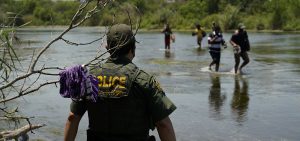News
Asylum Seekers Find Life-Changing Refuge In Athens
By: Theo Peck-Suzuki | Report for America
Posted on:
ATHENS, Ohio (WOUB) — For the last two years, the Athens United Immigrant Support Project (AUISP) has been working to help individuals who come to the United States fleeing abuse and persecution in their home countries. For those the group reaches, these efforts are life-changing.
Asylum seekers — migrants escaping their home countries in fear of their lives — are not undocumented immigrants. According to U.S. and international law, they have a right to live in the United States while they await the day their asylum claims are heard in court. However, the federal government has struggled to manage the number of asylum seekers arriving at the southern border in recent years. Many are sent to privately run detention centers, where conditions are prison-like.
In the summer of 2019, Athens resident Zach Reizes traveled to the southern border to witness conditions in the detention centers firsthand. What he saw shocked him and a number of other local residents into action. They formed AUISP to provide an alternative to detention through a legal procedure known as sponsorship.
“I think with lots of people, there’s a frustration about not always being able to do anything about these odd situations that exist in our country and in the world,” said AUISP member John Schmieding. “This was just a really tangible way to respond.”
Sponsorship is a process overseen by the Department of Homeland Security. By sponsoring asylum seekers, permanent residents of the U.S. promise to provide them with food, housing and other forms of support. What that looks like in practice varies widely based on what asylees need, where they are located and what resources the sponsors themselves have at their disposal. Typically, it also involves help finding legal counsel (immigration court is considered a civil court and asylees are not entitled by default to a lawyer).
“Your commitment, in general, is to provide a place to live, which can be with you or it can be somewhere else,” said AUISP secretary Anne Sparks. “But you’re going to stay in touch and make sure that basic needs for food and clothing are met, healthcare needs get met, and you really have to keep track of what is going on with their legal status and help them respond in the way they’re expected to respond — helping with transportation to appointments with ICE, for example.”

AUISP sponsors instead seek an environment in which new arrivals feel like welcomed guests. Some of their work is simple hospitality: trips to Columbus to find food that reminds asylees of home, tours of Southeast Ohio, birthday parties with homemade cakes. In addition, there are the many needs a person fleeing persecution may have when entering a foreign land — which, as AUISP quickly learned, can be difficult to predict ahead of time. For this reason, AUISP has adopted a model it calls “community sponsorship”: Rather than have individual sponsors assume full responsibility, the group and its wider social network come together to ensure that everything goes smoothly.
“There have been dozens of people in the last year in this area stepping up to do transportation, translating, and housing, and child care, and figuring out, getting through medical bureaucracies and benefits for immigrants and all sorts of things,” said AUISP president Debbie Schmieding. The group also comes together to cover costs, which can be extensive. For example, at least one asylee could not be released from detention until AUISP paid a $7,000 bond.
Their efforts have been so successful that a national organization, the Asylum Seeker Sponsorship Project, wants to help others replicate their approach.
Anne Sparks recalled one incident with an asylee in which AUISP’s community resources proved invaluable.
“She had been extremely depressed (in detention),” said Sparks. “She had relied a lot on her religious faith to keep her positive… so it was important to her to have a connection to a religious group. And it happened that I do have a church that she felt comfortable with… everyone who attended was very welcoming and even included some music that she had suggested in terms of praise songs and hymns that she knew.”
She added, “That worked out very well, but that’s not something you can predict ahead of time… This is the importance of having a community support system: Someone else may have that resource.”
Often, it is the warm welcome and sense of belonging they discover in Athens which leaves the deepest impact on asylum seekers. For many, Southeast Ohio is the first place in which they feel a sense of genuine safety since being forced to flee their homes. Although most eventually leave for other areas — places where they may have family or where jobs are easier to find — all of the asylees WOUB spoke with looked back on their time here with great fondness.
Debbie and John Schmieding shared a laugh as they recalled taking a young woman they were sponsoring on a kayak trip at Strouds Run.
“In the first hour of being out in the kayak, we probably got seventy-five feet because she couldn’t quite figure it out,” Debbie said.
“Lots of circles,” John interjected. “Lots of circles.”
“And we just laughed and laughed, but she loved it,” Debbie said. “And we went several times while she lived with us.”
That same young woman moved to the West Coast some months later, but her love of kayaking continues today.
Even after arriving in Athens, the path for asylees is still not easy. Until their cases are decided, they must contend with the possibility that one day soon, they will be sent back to their country of origin. That could be the difference between life and death.
For the members of AUISP, that’s all the more reason to do what they do.

